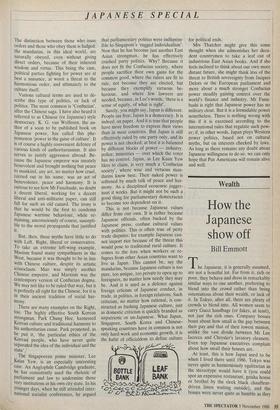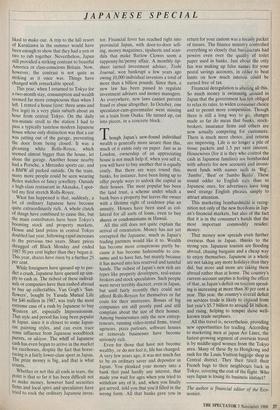Wealth
How the Japanese show off
Bill Emmott
At least, this is how Japan used to be when I lived there until 1986. Tokyo was never quite as harmoniously egalitarian as the stereotype would have it (you could spot an expensive restaurant, geisha house or brothel by the sleek black chauffeur- driven limos waiting outside), and the bosses were never quite as humble as they
JAPANESE SPECIAL
liked to make out. A trip to the hill resort of Karuizawa in the summer would have been enough to show that they had a yen or two to rub together. Nevertheless, Japan still provided a striking contrast to boastful America or class-conscious Britain. Now, however, the contrast is not quite as striking as it once was. Things have changed with remarkable speed.
This year, when I returned to Tokyo for a two-month stay, consumption and wealth seemed far more conspicuous than when I left. I rented a house (cost: three arms and five legs) in a very plain suburb about an hour from central Tokyo. On the daily ten-minute stroll to the station I had to pass a typically tasteless modern Japanese house whose only distinction was that a car was jutting out of the garage, preventing the door from being closed. It was a gleaming white Rolls-Royce, which seemed almost bigger than the house, let alone the garage. Another house nearby had a Porsche, a Mercedes sports car, and a BMW all parked outside. On the train, many more people could be seen wearing Rolex watches or fancy jewellery. Outside a high-class restaurant in Akasaka, I spot- ted my first stretch Rolls-Royce.
What has happened is that, suddenly, a lot of ordinary Japanese have become quite extraordinarily rich. A whole clutch of things have combined to cause this, but the main contributors have been Tokyo's booming stock and property markets. House and land prices in central Tokyo doubled last year, following rapid increases in the previous two years. Share prices shrugged off Black Monday and ended 1987 50 per cent higher than they began it. This year, shares have risen by a further 25 per cent.
While foreigners have queued up to pre- dict a crash, Japanese have queued up sim- ply to cash in. The richest of these individ- uals or companies have then rushed abroad to buy up collectables. Van Gogh's 'Sun- flowers', bought by Yasuda Mutual Life for $40 million in 1987, was truly the most extreme case of a rush by Japanese to buy Western art, especially Impressionism. That style and period has long been popular in Japan, since it is closest to some Japan- ese painting styles, and can even trace some influence from Japanese woodblock purists, or ukiyoe. The whiff of Japanese cash has even begun to arrive in the market for racehorses, despite the fact that horse- racing is a fairly lower-class sport in Japan. The prize money is big, and that is what counts.
Whether or not this all ends in tears, the point is that so far it has been difficult not to make money, however hard securities firms and local spivs and speculators have tried to rook the ordinary Japanese inves- tor. Financial fever has reached right into provincial Japan, with door-to-door sell- ing, money magazines, tipsheets and scan- dals that make Barlow Clowes seem a tuppenny-ha'penny affair. A monthly tip- sheet turned investment adviser, Toshi Journal, wen bankrupt a few years ago owing 10,000 individual investors a total of more than a billion pounds. Since then, a new law has been passed to regulate investment advisers and money managers. As everywhere, new laws cannot prevent fraud or abuse altogether. In October, one speculator-cum-greenmailer went missing on a train from Osaka. He turned up, cut into pieces, in a concrete block.
Though Japan's new-found individual wealth is generally more secure than this, much of it exists only on paper. Just as in London, ownership of an appreciating house is not much help if, when you sell it, you will have to buy another that is equally costly. But there are ways round this: banks, for instance, have been lining up to offer people ways to unlock the capital in their houses. The most popular has been the land trust, a scheme under which a bank buys a property but leaves the owner with a lifetime right of residence plus an annuity. Houses have been used as col- lateral for all sorts of loans, even to buy shares or condominiums in Hawaii.
All this still does not quite, explain the arrival of ostentation. Money has not yet corrupted the Japanese, much as Japan's trading partners would like it to. Wealth has become more conspicuous partly be- cause it has become fashionable to con- sume and to have fun, but mainly because it has moved into less reserved and tasteful hands. The richest of Japan's new rich are types like property developers, real-estate brokers and stock speculators. Such people were never terribly discreet, even in Japan, but until fairly recently they could not afford Rolls-Royces for themselves or fur coats for their mistresses. Bosses of big companies are still poorly paid and still complain about the size of their houses. Among businessmen only the new entrep- reneurs, running video-rental firms, travel agencies, pizza parlours, software houses or removals businesses have become seriously rich.
Even for those that have not become wealthy, or do not feel it, life has changed. A very few years ago, it was not much fun to be an ordinary saver and depositor in Japan. You plonked your money into a bank that paid hardly any interest, that made you wait for ages when you tried to withdraw any of it, and, when you finally got served, told you that you'd filled in the wrong form. All that banks gave you in return for your custom was a measly packet of tissues. The finance ministry controlled everything so closely that bureaucrats had powers even over the quality of toilet paper used in banks. Just about the only fun was making up false names for your postal savings accounts, in order to beat limits on how much interest could be earned free of tax.
Financial deregulation is altering all this. So much money is swimming around in Japan that the government has felt obliged to relax its rules, to widen consumer choice and to permit more competition. Though there is still a long way to go, changes made so far do mean that banks, stock- brokers, insurance firms and others are now actually competing for customers. There is much more choice, and returns are improving. Life is no longer a pile of tissue packets and 1.5 per cent interest. Housewives (for it is they who control the cash in Japanese families) are bombarded with adverts for new accounts and invest- ment funds with names such as 'Big', `Jumbo', 'Best' or 'Jumbo Besto'. These sound odder to English ears than to Japanese ones, for advertisers have long used strange English phrases simply to attract attention.
This marketing bombardment is recog- nition not only of the new freedoms in Jap- an's financial markets, but also of the fact that it is in the consumer's hands that the most important commodity resides: money.
That money now spreads even further overseas than in Japan, thanks to the strong yen. Japanese tourists are flooding abroad, chasing bargains and a cheap way to enjoy themselves. Japanese as a whole are not taking any more holidays than they did, but more. and more are taking them abroad rather than at home. The country's current-account surplus is feeling the effect of that, as Japan's deficit on tourism spend- ing is increasing at more than 30 per cent a year. This year, the country's overall deficit on services trade is likely to expand from last year's $5.7 billion to around $8 billion, and rising, helping to temper those well- known trade surpluses.
All this travel is, nevertheless, providing new opportunities for trading. According to marketing men at japan Air Lines, the fastest-growing segment of overseas travel is by middle-aged women from the Tokyo area. Many of these fly to Hongkong and rush for the Louis Vuitton luggage shop in Central district. They then resell their French bags to their neighbours back in Tokyo, covering the cost of the flight. Who says Japan is losing its business instinct?
The author is financial editor of the Eco- nomist.



































































 Previous page
Previous page